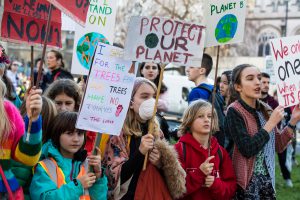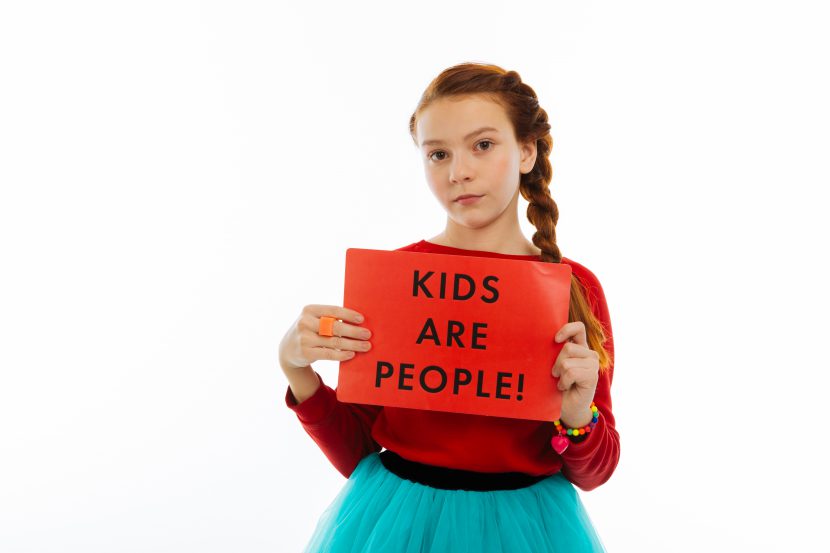Youth mobilisation has witnessed an important growth over the past decade, with children standing up for their rights and the rights of others. Examples are flourishing worldwide, with the latest and largest instance being their global mobilisation for climate awareness, standing up for their right to life, health, food, water and else. These children are classified as Children Human Rights Defenders. With this article, we celebrate the 30th anniversary of the Convention on Children’s Rights, drafted by our incredible partner Child Rights Connect, and the worldwide ratification of this declaration.
Who are Children Human Rights Defenders and why are they so essential?
According to the UN Declaration on Human Rights Defenders, a Human Right Defender is anyone who individually or in association with others, promotes or strives for the protection and realisation of Human Rights and fundamental freedoms at the local, regional, national or international level. The Declaration does not specify of any age restriction, Human Rights Defenders are thus anyone acting for the benefits of Human Rights protection.
Children play an essential role in this process and represent a powerful and undeniable voice for change. With having experience of having their own rights infringed, they can offer a valuable and relevant perspective on the reality of a child’s life along with an enhancement of areas of progress. Youth testimonies can have a wider convincing impact for change in comparison to adults speaking on their behalf, by highlighting facts, feelings, apprehensions and most importantly dismantling assumptions and stereotypes. In addition, Children’s awareness and knowledge of Human Rights enables them to not only stand up for their rights as children but also those of their peers and other adults. In a recent study, our partner Child Rights Connect highlighted the numerous topics Children Defenders touch on by their actions. The most reoccurring topics announced by the children interviewed varied from freedom of expression to rape, child marriage, voting age, discrimination, gender violence… (Child Rights Connect, 2018) This result shows a very wide spectrum of action, a certain plurality of convictions and most importantly a mindset that is not refrained by any age limitation.
This is another reminder that today’s children represent tomorrow’s adults, therefore increasing children’s knowledge and participation in the safeguarding of their most essential rights will have a valuable impact on tomorrow’s society and will likely embed a human rights culture amongst all.
Nonetheless, Children Human Rights Defenders still face numerous difficulties…
To this day, young defenders are confronted to a number of barriers when trying to express their opinion.
One of the most reoccurring issue is one of discrimination and incapacitation. Culturally, children have often been considered as having a lower societal status than adults. In most cultures, children are bound to silence and have to respect and learn from the adults’ opinions and convictions. This cultural background has spread numerous stereotypes through generations where children lack competency, responsibility, knowledge and experience to be able to form their own opinion. As a result, a child attempting to express its self-made opinion will automatically be undermined and discredited. This discrimination and incapacitation is witnessed locally within families and schools, but has also spread to the international stage where children are very often omitted from decision making, even with matters regarding their own rights, with the example of the International Labour Organisation not authorising children to voice their opinion during the Conference on Child Labour. It is thus important to acknowledge that contexts have evolved through generations, and children nowadays have access to more information than their peers did at their age, and to remember that children themselves are victims of infringement of their rights, thus are legitimate to have an opinion. In addition, legal instruments have also evolved throughout generations, and children are now entitled to being treated fairly and equally, along with being allowed and entitled to their own opinion. The observation shows that there exists a certain gap between legal reforms and cultural practice, and that actions need to be undertaken for children to continue defending anyone’s rights.
Another barrier faced by CHRDs is the concerning issue of the children’s protection while in action and the constant questioning of what is in the best interest of the child. In fact, over the past two decades the environment for young activists has been deteriorating and children defenders are more than ever at risk for their safety. Individuals standing up for their rights are increasingly bullied, imprisoned, tortured or even killed. A recent study estimates that over 300 defenders were killed in 2017 in 27 countries (Front Line Defenders, 2018), and this number does not include the physical and verbal abuse they face on a regular basis.
Consequently, institutions have found it rather challenging to strike a balance between empowering the child to defend his rights and looking after his protection and safety with regards to the child’s best interest. In fact, it would be contradictory to invite a child to stand up for his rights whilst that situation could jeopardise his safety and wellbeing.
There is no doubt that the safeguarding of children’s rights is in their best interest, however they have to be able to feel and be safe while doing so.

A collaborative responsibility to empower and protect our CHRD
There can be no realisation of rights without an organised and safe environment to defend them. Children Human Rights Defenders act as guardians of a peaceful, equal and free enjoyment of rights for all, along as a voice for the future, it is thus essential to empower and protect them to the best of our ability by the means of a collective effort.
What can be done?
On a governmental level: According to Article 12 of the Declaration on Human Rights Defenders, it is the responsibility of the State to provide protection for these children. It is thus crucial that governments worldwide take actions and measures by creating platforms for children to express their opinion publicly and safely, by launching awareness campaigns to increase their level of empowerment, by establishing text laws to not only legalise their actions but also protect them from any intimidation of doing so.
On an institutional level: Global institutions need to increase the level of involvement of children in discussions and decision-making, whether it is on a local, regional, national or international level. This can be done by easing the access to conferences, summits, discussions and allowing to take children’s statements in consideration when discussing their rights. In addition, local institutions such as schools need to include further education on children and human rights within their programme, starting from an early age. Children have a right to know about their rights, freedoms and duties.
On an individual level: In a way we are all responsible for the empowerment and protection of our children. We can all make a change by raising awareness about this issue, informing a child about his rights, and most importantly respect them for their opinions. Each of you, dear reader, can protect a child AND empower it into its unique strength.
Part of our work at Humanium is to empower children to defend their most essential rights and assisting them when doing so, whether it is immediately on the ground, by answering legal matters or via our website by raising awareness about violations and issues. We believe that no matter if black or white, woman or man, child or adult, it is by means of cooperation that we can make our beautiful planet more peaceful. It is thus of importance and in total accordance with our values that we wanted to use this article to empower the Human Rights Defenders of tomorrow along with recognising the Rights of every child across the world.
Written by Maureen Fauconnier
References:
UN Declaration on Human Rights Defenders, 1998 [Online] https://www.ohchr.org/en/issues/srhrdefenders/pages/declaration.aspx
Child Rights Connect, “ The views, perspectives and recommendations of children across the world”, 2018 [Online] https://www.childrightsconnect.org/wp-content/uploads/2018/09/DGD-REPORT_WEB_en_def_web.pdf
Front Line Defenders, “Annual Report on Human Rights Defenders at Risk in 2017”, 2018 [Online] https://www.frontlinedefenders.org/en/resource-publication/annual-report-human-rights-defenders-risk-2017 UN


